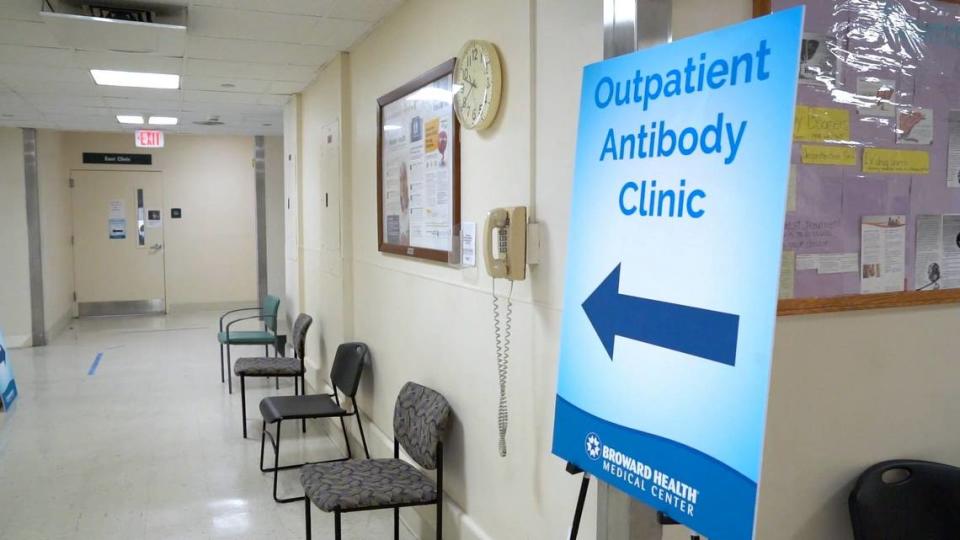FDA rescinds approval for some monoclonal antibody therapies, angering DeSantis
- Oops!Something went wrong.Please try again later.
The U.S. Food and Drug Administration on Monday essentially barred healthcare providers from using two monoclonal antibody therapies that have been central to Florida’s effort to fight COVID-19 but that experts say have not been effective against the omicron variant.
As a result, the federal government said it would not send more of those monoclonal therapies, which are manufactured by Regeneron and Eli Lilly, to the 50 states or territories this week.
Florida officials were not happy.
“Florida disagrees with the decision to halt Regen-COV in the absence of clinically-based evidence, which to date has not been provided by the FDA,” Deputy Secretary for Health Kenneth Scheppke wrote in a letter to Biden administration health officials Monday. “Such decisions from the federal level continue to [be] made in this haphazard manner.”
The state’s Department of Health announced it would shut down state-run monoclonal antibody sites “until further notice” as a result of the federal government’s decision in a tweet late Monday night.
The change in authorization was intended to save the treatments for situations where they’re likely to be effective, the FDA said in a statement announcing the move.
Experts — including those employed at the two companies that make the treatments — say those two monoclonal antibody therapies do not recognize the omicron variant of SARS-CoV-2, and therefore will be ineffective in treating COVID-19 infections caused by it. That variant made up more than 99 percent of American cases as of Jan. 15, the FDA noted.
On Jan. 19, the National Institutes of Health updated its COVID-19 treatment guidelines, writing that the omicron variant is “predicted to have markedly reduced susceptibility” to the two treatments.
Scientists have drawn this conclusion based on how the therapies interact with the virus’ spike protein. Mutations on the protein appear to allow omicron to evade some of the known treatments. Earlier this month, New York University virologist Celine Gounder told the Herald/Times that the treatments made by Regeneron and Eli Lilly “do not recognize the omicron virus,” and for that reason, “they simply do not work.”
In its updated fact sheet for healthcare providers, the FDA wrote that the Regeneron treatment is more than 1,000 times less effective against Omicron than past strains.
Gov. Ron DeSantis and his health officials, however, say the federal government has not proven the treatments to be ineffective in a clinical setting. For that reason, Florida officials want to see more of the drugs shipped to state monoclonal antibody treatment centers.
They won’t get their wish this week. According to a federal database, Florida is set to get about 34,000 doses of monoclonal antibody treatments — but none of them will be doses of Regeneron or Eli Lilly monoclonal antibodies. Instead, Florida will get about 3,200 doses of the monoclonal antibody manufactured by Sotrovimab; about 4,700 doses of AstraZeneca’s Evusheld treatment meant for high-risk patients and some 26,000 total doses of antiviral pills developed by Merck and Pfizer.
“Without a shred of clinical data to support this action, Biden has forced trained medical professionals to choose between treating their patients or breaking the law,” DeSantis said in a statement released late Monday that condemned the decision to limit the emergency use authorizations for the two drugs.
The state particularly objected to the federal government sending about 21,000 doses of Merck’s antiviral medication molnupiravir. Jeremy Redfern, a Department of Health spokesperson, noted in tweets that the drug has been shown to be less effective than initially hoped.
It’s not the first time the state has clashed with the Biden administration over monoclonal antibody treatments. Last September, DeSantis criticized the federal government for changing the way the treatments were distributed. He predicted the change would result in a statewide shortage. For months, however, the therapies remained plentiful.
Then in December, omicron arrived in Florida, causing an unprecedented spike in case numbers. The uptick in cases coincided with a Dec. 23 Biden administration announcement that it would cut back on shipments of Regeneron and Eli Lilly to states. Federal officials gave the same reason then: The treatments were not proving effective against the variant.
After a letter from Surgeon General Joseph Ladapo and some choice words from DeSantis, federal officials reversed course and resumed shipping the treatments to Florida by the thousands.
On Monday, state officials weren’t just upset with the federal government’s message about the monoclonal antibody treatments. In his letter, Scheppke criticized the way the federal government communicates with state officials. He accused the federal government of canceling a scheduled call in order to avoid a confrontation over the forthcoming change in authorization.
CNN first reported over the weekend that federal officials were considering such a change.
“Rather than transparent communication from the federal government to states, decisions continue to be made through news cycles,” Scheppke wrote.
A Health and Human Services spokesperson did not address questions about the federal government’s communication with Florida in the statement provided to the Herald/Times.


